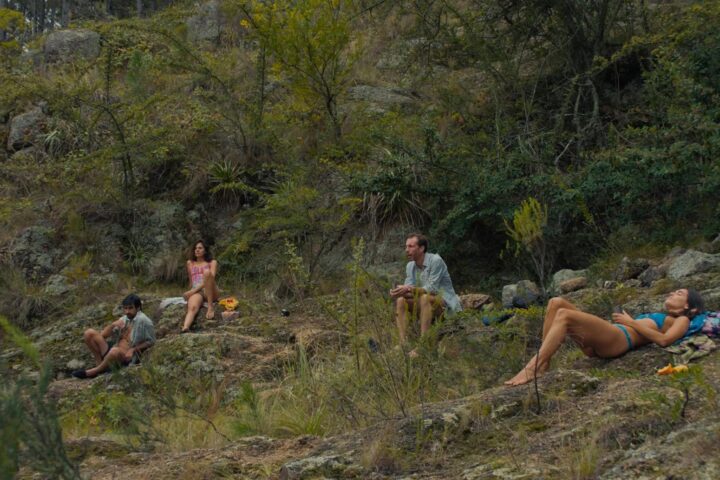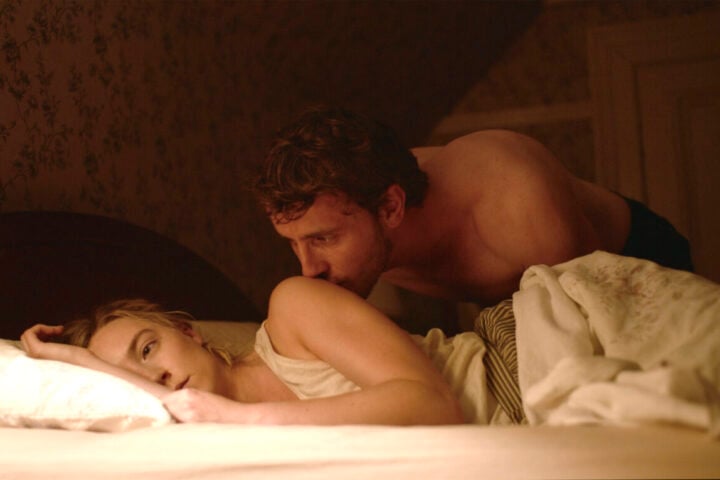Writer-director Martín Rejtman’s La Práctica skillfully eases us into a world where yoga is a lifestyle and not just an exercise. This is a world that promises health for the health-conscious, an improvement of one’s life through strict scheduling discipline, and freedom from earthly troubles thanks to the influence of Hinduism that can still be felt in yoga’s practice. Pity, then, that Gustavo (Esteban Bigliardi), an Argentinian yoga instructor living in Chile, is no longer grounded in his connection to that practice, as his separation from his wife, Vanesa (Manuela Oyarzún), prompts a series of life changes that a Vinyasa pose can’t fix.
Despite his dedication to exercise and a vegan diet, Gustavo’s health is threatened by a series of stretching accidents and pratfalls, forcing him to teach his yoga classes with a limp. He lives, at first, with Vanesa’s brother and the man’s wife, who consistently comment on his life choices, then later by himself in a vacationing student’s small room, where he’s immediately informed that there’s no hot water. Worst of all, every decision in his life is being made for him by his wife, his mother, his young landlord, and his therapist. Instead of realizing yoga’s spiritual promise of ananda, the practice has left him with a prescription for SSRIs.
Rejtman’s fifth feature fits nicely into his catalog of low-stakes black comedies full of characters who are too busy hanging out to really care about anything else. A scene at the yoga studio may suddenly be followed by a scene of Gustavo at dinner, accompanied by just a line or two of narration to explain how and why he got there. These scenes are written in such a way that they suggest self-contained episodes, with Rejtman sparing us unnecessary exposition or tension that would ruin their carefully constructed mood. Each scene, then, feels like an opportunity for the universe to play another unpredictable joke on Gustavo or for another relationship to develop.
La Práctica’s patchwork of serio-comic scenes shows how Gustavo is paralyzed by his neuroses. At one point, a short bit of narration reveals that he suspects one of his students of stealing everyone’s phones from the yoga studio’s locker room. That puts him in an awkward situation when, after partying at his new love interest’s apartment, he catches the student sleeping on the couch. As he doesn’t have evidence of the student’s wrongdoing, Gustavo struggles to give his reasons for why the student shouldn’t stay over, but, really, he’s more worried, and rightfully so, about his love interest hooking up with the student. Here and elsewhere, Rejtman’s look at how the man’s inaction compounds his misery is a wonder of meticulously layered characterization.
Rejtman’s still camera, which generally frames half the room in any given scene, allows for moments of irony and absurdity to land as lighthearted jokes, such as an affair being revealed by a character walking into frame during breakfast or Gustavo disappearing from the frame as he takes another fall. And despite the characters’ growing intimacy, they all speak in a deadpan manner reminiscent of characters from a Aki Kaurismäki or Jim Jarmusch film, which makes a fellow yoga instructor’s suggestion that Gustavo fix his medical problems with Russian YouTube video exercises sound even more ridiculous than it already does. Such subtle humor is La Práctica’s way of highlighting the follies of a world of regimented self-improvement, in the process reminding us of how absurd and beautiful a mortal life can be.
Since 2001, we've brought you uncompromising, candid takes on the world of film, music, television, video games, theater, and more. Independently owned and operated publications like Slant have been hit hard in recent years, but we’re committed to keeping our content free and accessible—meaning no paywalls or fees.
If you like what we do, please consider subscribing to our Patreon or making a donation.



